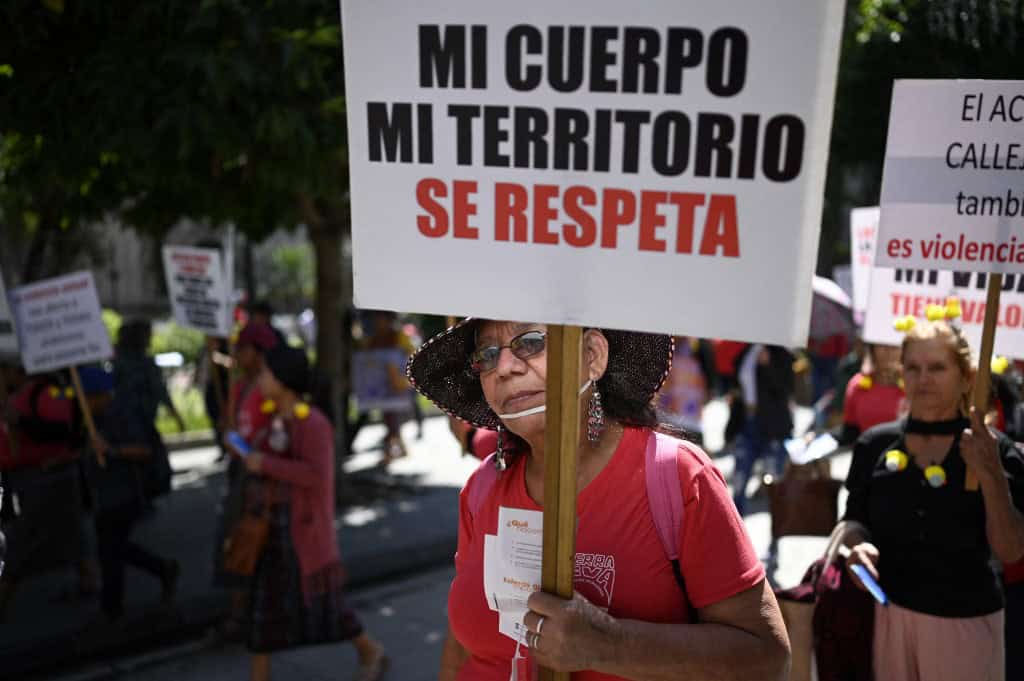QCOSTARICA — An analysis of a Center for Research and Political Studies (CIEP) of the University of Costa Rica (UCR) survey shows strong polarization between groups supporting President Rodrigo Chaves, who cling to elections to the detriment of other forms of political participation, and opponents who advocate protest, but are increasingly disappointed with the fight at the polls
Support for President Rodrigo Chaves is fueled by authoritarian views and is strengthened among people who privilege elections as the main form of political participation, but is weakened if it has to take place in the streets and in an organization that transcends the date with the ballot box.
On the contrary, critical views of Chaves show a tendency to vindicate the different forms of political action, including protest, but they show a growing disappointment with politics in general, and particularly with electoral processes, for which there is little enthusiasm.
– Advertisement –
This is the main conclusion of a study carried out by university academics Marco Fournier and Ciska Raventos to break down support for the president, based on an analysis of the CIEP survey.
Fournier and Raventos reviewed the survey Citizen Participation and Abstention in the Electoral Processes of 2022 in Costa Rica, carried out between September and October 2022, from which they defined six different profiles, based on the behavior at the polls and the support or rejection of the president’s management of those who responded to the measurement (See box: “Support profiles”).
“Although some situations have changed, such as support for President Rodrigo Chaves, which has decreased since the survey was conducted, we can say that it shows how the political sphere has become polarized. There are totally opposing blocs,” Founier said.
The key to the context
There are key elements to dimension this analysis: in recent years, sympathy for political parties has been constantly devalued (see graph “Party sympathy…), which makes it more relevant to analyze the case of Rodrigo Chaves, who before the electoral campaign was only known by 2% of those interviewed in the CIEP survey.
The study indicates that one can speak of a “Chaves phenomenon” due to his irruption on the electoral scene in such a short time, and due to the positive approval he registered months after assuming the Presidency (see graph: “The President’s support”).
However, this must be put into perspective: at the polls, Chaves did not achieve the support of more than a third of the electorate and, even with the vote against José María Figueres and the PLN, he never managed to overcome abstentionism. Hence, the task of unraveling the composition of support, of almost 8 out of 10 respondents in 2022, is timely.
– Advertisement –
The weakness of strong Chavismo
In the midst of the exercise of characterizing different groups of voters, Fournier highlighted that a “hard Chavismo” can be identified, mainly in the voters of the first round, but generally made up of those who voted for the president and had a positive opinion.
However, there were other levels. “It is a complex phenomenon to analyze; there were people who did not vote for Chavez in either of the two rounds, but supported him, and also people who voted for him, but did not have an opinion on his management; they were waiting,” Fournier mentioned.
But, amid the different levels of support, some trends seemed to emerge: among support for the president, there were higher levels of affinity with authoritarianism and with political participation limited to the polls. Conversely, the more Chavismo there is, the less appreciation there is for protests, for resorting to marches and demonstrations to defend principles.
“In the most orthodox Chavismo, there are citizens who are very attached to representative democracy, but who tend to participate only when there are elections. At the other extreme, there are people with greater participation at other levels, but with an enormous level of disappointment, with a shared depression. They have a past of greater participation, but they do not seem enthusiastic about the future,” commented Fournier.
– Advertisement –
This suggests a weakness in the strongest Chavismo: its limited experience in forms of political participation. This would explain the contrast between the demonstrations of those opposed to Chavez, who have taken to the streets on several occasions, with the weak efforts of the president’s supporters to carry out marches to testify to the supposed support of the people for their leader (see box “The contrast between the marches”).
Fournier also mentioned another element that could be crucial: Chavez’s followers, who are in favor of representative democracy and its manifestation in results, could achieve greater representation in these surveys, since the opposition, with its growing disenchantment with politics in general, would have a greater tendency to reject participation of all kinds. “There is a significant increase in rejecting surveys that should be valued, although there is no proven relationship,” he warned.
In this sense, the last municipal election, with its differences with respect to the presidential contest, also gave clues: CIEP surveys recorded that around a quarter of those interviewed stated that they would vote for one of Chavez’s parties, but, at the polls, the Chavista parties did not reach even 5% of the vote for councilors (See graph).
It can be argued that the rejected candidacies of Aquí Costa Rica Manda and Pueblo Soberano influenced in cooling off some voters, but this exemplifies what can happen when people with less experience in political activities must try to move from saying to organizing.
The strength of polarization
Similarly, the weakness of the opposition to Chavismo would be in its growing disenchantment with politics, which would increase the chances that, instead of participating, it would increase abstentionism… and protest actions, which it values and in which it has participated to a greater extent.
The reading is obvious: an opposition to Chavismo that believes in institutions, but is disenchanted with the electoral contest, could leave the field for forces with less support, but more enthusiasm, to reach key positions.
For Fournier, the great balance should motivate greater reflection, since it points to a growing polarization, with increasingly opposed groups. “It must be considered that support for Chavez has decreased since the 2022 survey, but, in general, this illustrates a panorama with opposing groups,” he explained.
Additionally, greater volatility in the political spectrum must be considered. The panorama of identification with a political party seems on the way to extinction. In this study, the emphasis is on people who, despite not voting for Chaves, later supported him, or those who voted for him, but were waiting. Signs that political profiles are a reading to analyze the political panorama, but they are not written in stone.
Support profiles
Researchers Marco Fournier and Ciska Raventós defined six specific groups of voters to be analyzed, based on the results of the survey on citizen participation carried out by the Center for Research and Political Studies (CIEP) of the University of Costa Rica, in October 2022:
Original Chavismo
They voted for Chaves in the first round, 90% of them did so later in the second round. They came to represent around 10% of the electorate in that first round.
They conceive political participation basically as going to vote, and at the same time they have a lower level of abstentionism than other groups. They associate more positive emotions with politics.
However, they also have the highest levels of authoritarianism, while considering protest activities as alien to politics.
Second-wave Chavismo
They voted for Chaves in the second round. They came to represent 29% of the electorate in that second round.
Unlike the original Chavismo, they have higher levels of political participation, including in protest activities, but in general in a greater number of organizations of all kinds.
They have a high perception of corruption in recent governments.
Chavismo outside the polls
They did not vote for Chaves, but they support him in polls and would be key in allowing the administration to achieve approval levels much higher than the president’s voting levels.
They represented 34.8% of the total opinions in the survey (Remember that Chaves did not exceed 30% of the electorate, but support levels were at 79% in August 2022, during the CIEP survey).
This group has greater confidence in the country’s institutions, except for the media.
They have lower levels of political participation compared to people critical of the government, but they tend to perceive the results of different forms of politics better, with the exception of protests.
Hard Chavismo
They voted for Chavez in at least one of the two elections and support him in the polls.
They tend to look for information in conversations and social networks. And although they mostly have a negative opinion of politics and a worse opinion, in general, of politicians, they associate politics with positive emotions.
They trust public institutions less, but more in elections and have a greater inclination towards authoritarianism.
Lukewarm Chavismo
They voted for Chavez in at least one of the elections, but they did not have an opinion about the government at the time of the poll.
The survey identified 29.3% of people who had voted for Chavez at least once, but who at that time considered it too early to give an opinion on the government’s performance.
This segment showed less confidence in institutions and political-electoral organizations, and showed fewer positive emotions associated with politics, with a worse image of the elections, but curiously, with a better opinion of politicians.
They showed a lower level of participation in politics in the past and a closeness to party identification and, in line with this trend, they showed lower levels of political participation in the future.
Critics of Chavez
The group most distant from the president did not vote for him in either round and reported a negative assessment of the government.
This group recorded a high level of participation in politics in the past, including protest actions.
However, there is also a general feeling of disappointment, with people tending to perceive political actions as ineffective. In line with this perception, their willingness to participate in political actions in the future is very low, consistent with a tendency towards a more negative perception of elections.
In general, they tend to associate fewer positive emotions with politics, as well as significantly lower levels of authoritarianism than other segments.
Translated and adapted from SemanarioUniversidad.com
– Advertisement –
Source link
Q Costa Rica



